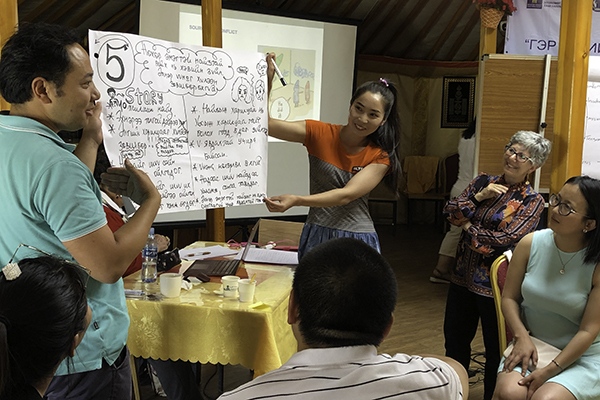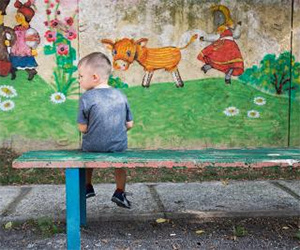
By Jennifer Scott, Rotary Club of Central Blue Mountains, New South Wales, Australia
Mongolia, a country caught between two giants – China and Russia, is a long, long way from Australia and I never planned to travel there. However, like many Rotary projects, it is through networking and circumstance that you find an opportunity to make a difference. Mine came as part of a vocational training team to Mongolia to conduct workshops to empower single fathers.
In 2017, I ran into Kathyrn Johnson, a fellow mediator, who had just returned from Mongolia where her brother was making a documentary. She had met Professor Namjil from Ulaanbaatar University, who told her how he had been asked for help by a group of 150 single fathers, many of them disabled or unemployed or both. The men were from Erdenet city, a mining town about 300 kilometers from Ulaanbaatar, and were lost in a culture where the very notion of a father raising their children alone was alien.
Professor Namjil explained how it was not uncommon in Mongolia for women to be better educated than the men due to their nomadic tradition. Boys were kept behind to assist with the seasonal movement of the herds while women could be sent to gain their education as a means of assisting the welfare of the family. In recent years this was causing a societal problem. The men felt their traditional skills of horsemanship and herding were no longer useful in an urban setting, causing a feeling of disempowerment which led to depression, alcohol abuse and domestic violence, particularly in the mining towns with high unemployment.
As the women were better educated and thus more confident than the men, they would separate from their husbands, and sometimes from their children, in pursuit of better jobs. This resulted in a very high divorce rate.
On her return to Australia, Kathyrn explained the dilemma, and asked if Rotary could assist. We put together a team of experts and I contacted the Rotary Club of Ulaanbaatar to seek their guidance and support.
So, in March 2018, all eight of us, known as the Mongolian delegation, ventured into the freezing temperatures of Mongolia for two weeks to conduct our needs analysis. We were delighted to be warmed by the wonderful hospitality and willingness of the Mongolian organisations we met to learn. Enkhtuya Sukhbaatar, a social worker and Rotarian from the Rotary club of Ulaanbaatar, connected us with the Judicial Council of Mongolia and the National Family, Youth and Child Development Authority as well as the men from Erdenet. With the outcomes from the needs assessment we received a global grant from The Rotary Foundation for our vocational training team.

Read more about this vocational training team and projects empowering fathers in the September Rotary magazine
Both the Judicial Council and the National Authority recognized the need for further training. The council is the official organization that trains and gives accreditation to mediators, while the National Authority is a group of psychologists, social workers, and administrators who work with families on a grass roots level.
Mediation was a relatively new concept in Mongolia and had been used, quite successfully in commercial disputes. Unfortunately, it was not very successful for matters of Family Law having only reached a success rate of 12% in March 2018.
Our needs assessment discovered that part of the lack of success stemmed from the fact that there is no Mongolian word for “mediation.” The closest is “reconciliation.” Hence, the mediators, psychologist, and social workers were under the impression that the aim of mediation was to reconcile the parties so that they did not divorce. We realised we had to address this as part of the training program. The Rotary Club of Ulaanbaatar developed Mongolian terms for the concept of mediation and club members volunteered their time as interpreters.
The date for the training was chosen to coincide with Naadam, Mongolia’s most significant festival of the year. The team developed a comprehensive workbook which was then translated into Mongolian by Rotarians.
The whole training lasted nine-days – four days with the Authority and five days with the Judicial Council. The training was delivered in rather ornate gurs located in the countryside.
Of the 150 men from Erdenet, 22 were able to travel to Ulaanbaatar. Through sharing stories together without the presence of women, the men understood the significance of fatherhood not only as fathers with their own children, but also collectively. As they developed new guiding principles for what it meant to be a father in modern day Mongolia, they felt empowered to make decisions that could benefit themselves and their children despite their obvious loss of their original identity as herdsmen.
They also grew to acknowledge that the loss of their nomadic identity and the loss of their personal link to the land contributed to their depression and uncontrolled anger. With the ongoing support from the social workers and psychologists they felt they could now go back to Erdenet and encourage the other men to similarly self-empower.
For their part, the Council’s mediators grew in their understanding of the needs of the parties in dispute to acknowledge the extent of their loss. They became better able to assist the parties in moving forward to create stronger families.
And the Authority’s psychologists and social workers recognized that they had to change focus from being an advisory body to being one that teaches families how to better use conflict resolution and conflict management skills.
Through Rotary, I was able to be a part of an effort that not only resulted in personal empowerment, but also systemic change. We provided professional and academic support, but the locals picked it up and ran with it. The entire project underscored how the role of fathers is too often overlooked and underserved.
Jennifer Scott, a member of the Rotary Club of Central Blue Mountains, New South Wales, Australia, is a past governor of District 9685. She is a member of The Rotary Foundation Cadre of Technical Advisers and works in law and mediation.
https://blog.rotary.org/2022/09/27/vocational-training-team-empowers-fathers-in-mongolia/

